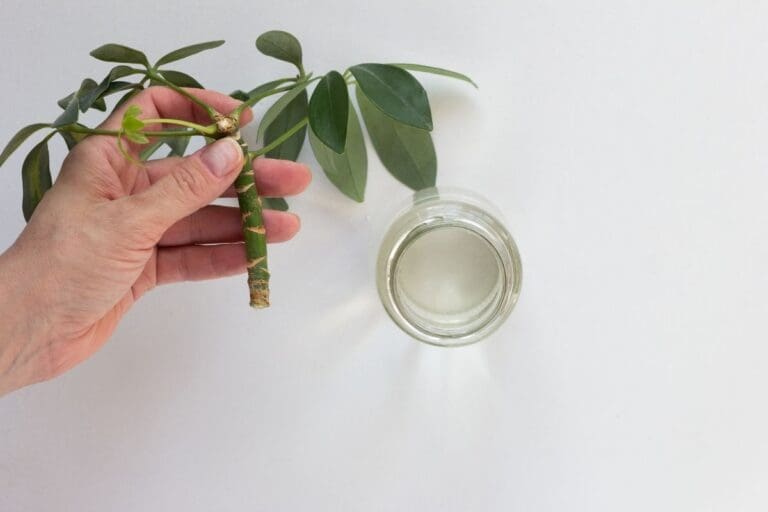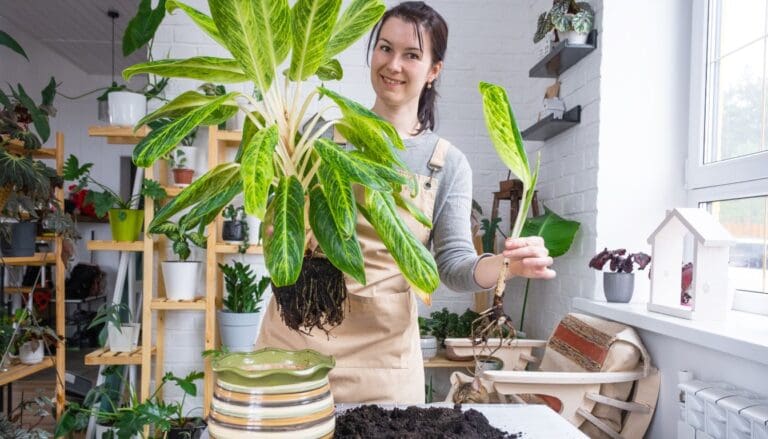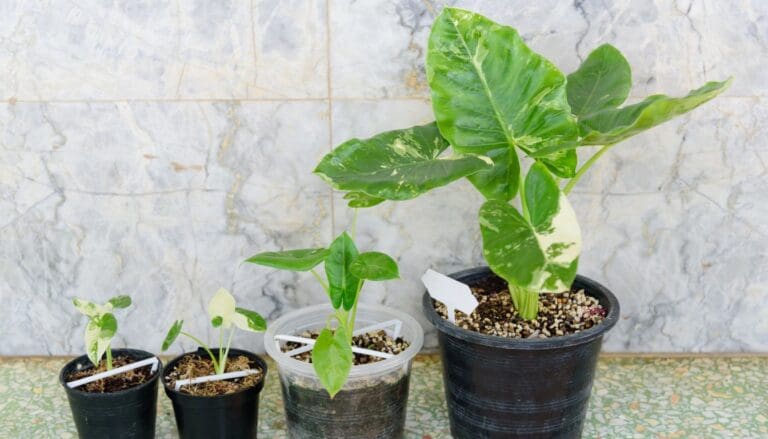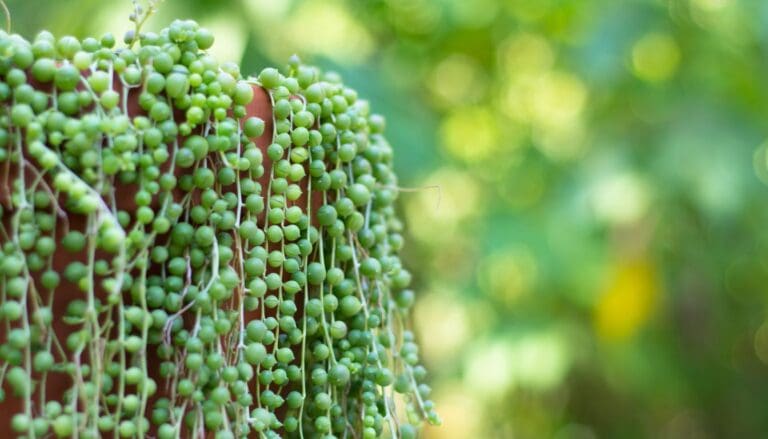What Fertilizer Is Good For Croton? (Best Fertilizer For Croton Plant)
Crotons are low-maintenance houseplants and can be grown easily. Fertilizing is vital for almost every kind of plant. And just like the other plants, crotons also need fertilizers to grow efficiently.
This article will help you to understand all the fertilization requirements of crotons. We will also understand what fertilizer is good for crotons.
In general, croton needs to be fertilized using a liquid fertilizer with an NPK ratio of 3-1-2. Crotons are heavy-feeders and need to be fertilized once a month, especially during their growing season. You can also use compost or other organic fertilizer on alternate months to supplement it.
In this article, you will get to know every detail about the type of fertilizer you can use for crotons, how frequently you should fertilize, and how to fertilize. Now, let’s find out.

Please note: Simplify Plants is reader-supported. Some links in the post are affiliate links and I get a commission from purchases made through links in the post.
Why is fertilizing Crotons important?
Crotons need a sufficient amount of nutrients to thrive. Fertilizing crotons are considered essential because they promote healthy growth, mainly during their growing season.
We use a potting mix rich in nutrients to encourage their growth at the planting time.
But after a particular time, soil loses all its nutrients because of all the watering. Due to this, the plant doesn’t get the nutrients and fails to grow properly.
So fertilizing crotons from time to time is important as soil and water do not provide the adequate amount of nutrients that fertilizers can.
If nutrients are absent in Crotons, they will get fragile. After a specific time, it will become difficult for them to live, and they will eventually give up on you.
Without proper nutrients, Crotons will face various difficulties such as:
- Weak stems
- Faded foliage
- Leggy growth
- Stunted growth
- Weak roots
- Smaller leaves
- Drooping leaves
If your Crotons show any of these signs, it might be due to a lack of fertilization, and you should immediately provide them with the nutrients they need without wasting any time.
What nutrients do fertilizers have?

Before you decide to fertilize your Crotons, you need to understand all the fertilizers’ nutrients and how they help the plant grow effectively.
Plants generally need two types of nutrients: micronutrients and macronutrients. Both contain a certain amount of minerals which is essential for the plant’s growth.
Let us discuss both of the nutrients in detail.
Macronutrients: These nutrients should be provided considerably to plants for development and growth.
Usually, crotons need three macronutrients: Nitrogen, Phosphorus, and Potassium. These nutrients usually are classified as NPK.
Other than that, there are other macronutrients too that most of the plants need:
- Sulfur
- Calcium
- Magnesium
- Carbon
- Oxygen
- Hydrogen
Micronutrients: Micronutrients should be provided in a minimal amount. You should not provide these nutrients in large quantities as a little bit is enough for the plant to thrive.
Essential micronutrients for plants are:
- Boron
- Manganese
- Zinc
- Iron
- Copper
What is the best fertilizer for crotons?
For best results, you need to choose a proper fertilizer for crotons.
The NPK ratio requirement of crotons is quite different from other plants. They do not need a balanced fertilizer.
There are two different NPK ratios for Crotons, and you can use either of them. NPK ratios that are suitable for this plant are 20-20-20 and 3-1-2. The 3-1-2 is the preferred one.
In the first ratio, the amount of potassium is more. In the second ratio, the amount of nitrogen is more. You should choose the fertilizer according to the quality of the soil.
Don’t get confused because all the plants need a well-balanced fertilizer as it does not apply to Crotons. The ratio differs for every plant.
Now let us see how these nutrients help Crotons develop and grow.
- Nitrogen helps in regulating the process of photosynthesis and foliage growth.
- Phosphorus helps in root growth.
- Potassium helps maintain the water balance of all the plant parts and strengthens them.
Types of fertilizers
There are 3 types of fertilizers:
- Granular fertilizer
- Slow-release fertilizer
- Liquid fertilizer
Granular fertilizer
Granular fertilizer comes in little pieces like pellets. This fertilizer is added to the soil directly to provide nutrients.
But these are used mainly for outdoor plants. This type of fertilizer provides nutrients in a large amount and can hamper the plant’s roots and even burn them.
These fertilizers have a high amount of nitrogen and potassium, which can over-fertilize your crotons. It is not the best choice for crotons as they are indoor plants and sensitive to such heavy fertilizers.
Slow-release fertilizer
Slow-release fertilizer breaks down the nutrients slowly every time you water the plant. These are also primarily for outdoor garden plants.
These fertilizers release few nutrients every time after watering. These are also not very suitable for crotons as you cannot control the plant’s nutrients.
Liquid fertilizer

Liquid fertilizer is one of the convenient choices for indoor plants. This fertilizer comes in both liquid and powder form.
In the case of powder, you need to mix it with the water for making a liquid fertilizer and are known as water-soluble fertilizers.
Liquid fertilizer is the best choice for crotons as it does not cause over-fertilization. You can easily control the number of nutrients you need to provide your crotons.
If the fertilizer contains a high dose of nutrients, you can mix it with more water to reduce the nutrient level. So, it makes it suitable for crotons.
Can you use compost as a fertilizer?
Some people don’t like to use chemical fertilizers on their plants because of their toxic content. Instead of chemical fertilizers, they can use compost made up of organic matter like dry leaves, clover, grass clippings, food scraps, etc.
You can add compost directly into the soil. This compost breaks down slowly into the soil and provides nutrients to the plant.
But as you already know, crotons are heavy feeders, and compost doesn’t contain all the nutrients this plant might need. So it can create some issues for crotons.
Also, you don’t know how much nutrients your crotons are getting. Neither can you control it, so this is another disadvantage of compost.
But if you want to use compost, don’t just depend on that as it will not be enough for your crotons. Fertilize your plant with compost if you want them to get all the nutrition.
Do crotons like coffee grounds?

Many people use coffee grounds to provide nutrients to their plants.
Coffee grounds are best for those plants which like to stay in acidic soil.
Crotons prefer soil that is quite acidic, so there is no problem using coffee grounds for this plant.
But applying directly into the soil can harm the plant and even burn the roots. You can use coffee grounds by mixing them with compost or liquid fertilizer.
In the case of liquid fertilizer, you should soak coffee grounds in the water for at least 1 week and then apply it.
It is excellent for promoting growth, but you should avoid this if the soil is already acidic, as it can cause severe damage to your crotons.
Suggested fertilizer for crotons
Sometimes it becomes difficult for people to decide the right fertilizer for crotons. If you are getting trouble choosing a suitable product for crotons, you don’t have to worry about it.
I will suggest to you the best kind of fertilizers for crotons. So let us see the suggested products:
- 10:10:10 All-purpose liquid fertilizer.
- Fiddle Leaf Fig Tree Plant Food 3-1-2 NPK ratio liquid fertilizer.
- Charlie compost
These are the best fertilizers for crotons, in my opinion. You can use any of them without any further confusion.
How much fertilizer do crotons need?

Crotons need a small quantity of fertilizer. Applying higher doses of fertilizer at once can harm your plant.
While using a liquid fertilizer, first mix it with the normal water and then apply it to the soil. This will prevent overfertilization.
While applying compost, you can just add a little of it into the soil as the huge compost quantity might be insensitive to crotons.
How often should you fertilize crotons?
Crotons need fertilizers every 2-3 weeks during summer and spring.
These plants need to be fertilized only in their growing season. Winter is the dormancy period for crotons, so you should avoid fertilizing at that time; otherwise, it will injure the roots.
It depends on the climate whether you should fertilize your crotons in winter or not. If the climate is not that cold and the plant is receiving enough light, you can fertilize your crotons every 4 weeks with a smaller dose.
On the other hand, if the climate is cold, don’t disturb your plant by applying fertilizers. You just have to check upon your crotons frequently when they need fertilizers and provide according to that.
How to fertilize crotons?

Fertilizing crotons is not that complicated. Let us see how you should fertilize your crotons:
- At first, water your plant to keep the soil moisturized. Otherwise, the dry soil will not be able to absorb the fertilizer.
- After that, choose the best fertilizer for your crotons with the NPK ratio mentioned in this article.
- Then, mix the fertilizer with water to improve the consistency.
- Now, apply the liquid solution to the soil gently.
- If you are using coffee grounds, prepare a liquid fertilizer by soaking them into the water. When the solution is ready, apply it to the soil.
- In the case of compost, take compost as much as your hand can grasp and add it to the soil.
- Then water your crotons to get mixed evenly with the soil so that the compost will get mixed.
What happens if you overfertilize crotons?
Overfertilization is the most common issue. People who don’t know how much quantity to use or have made a mistake by fertilizing too often can cause over-fertilization.
Crotons will show many signs if they are over-fertilized by any chance. The common signs are:
- Brown tips on leaves
- Brown spots on leaves
- The white crust on the soil surface
- Yellow leaves
- Stunted growth
- Wilting leaves
If you don’t want your Crotons to get overfertilized, you should always mix fertilizer with water and apply it.
How to fix overfertilized crotons?
If your croton is overfertilized, you can fix them by following the steps given below:
- Prune all the damaged and affected parts of the crotons.
- Scratch the top layer of the soil with the help of your hand.
- Then wash the soil by watering it until the extra fertilizer comes out from the container.
- You can also re-pot your crotons using a new potting mix. Make sure you remove all the injured roots and keep only the healthy ones.
- When the situation is under control, you can start fertilizing your crotons just like before but keep in mind that you add smaller doses this time.
Final words
Crotons are heavy feeders but don’t mistake by applying excess fertilizer at once. Heavy feeders need all kinds of nutrients every month to grow efficiently, but that doesn’t mean you will overfertilize them.
Fertilize your crotons every 2-3 weeks by diluting the fertilizer with water. This will help the crotons to get all kinds of nutrients properly without causing overfertilization.
You can attract pests due to organic fertilizers. If you have used them, then look after your crotons frequently and check whether pests attack them or not.
Fertilizing crotons is not at all a complicated process. Choosing the correct fertilizer is the main task. After the choosing process, follow the steps given in this article.
Reference: Sciencedirect, Wikipedia, Wikipedia, Britannica, CABI, Academia, University of South Florida, The University of Georgia.
Recommended Garden Supplies
| Product Image | Our Recommended Gardening Supplies | Check Offers! |
|---|---|---|
Top Top
Top
Top
Top
Top
Top
Top
Top | rePotme Houseplant and Tropical Classic Potting Soil Mix | Check Offer On Amazon |
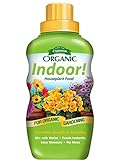 Top
Top
Top
Top
Top
Top
Top
Top | Espoma Organic Indoor Plant Food | Check Offer On Amazon |
 Top
Top
Top
Top
Top
Top
Top
Top | GooingTop LED Grow Light 6000K Full Spectrum Clip Plant Growing Lamp | Check Offer On Amazon |
 Top
Top
Top
Top
Top
Top
Top
Top | Soil Moisture Meter | Check Offer On Amazon |
 Top
Top
Top
Top
Top
Top
Top
Top | Govee Hygrometer Thermometer, Bluetooth Enabled! | Check Offer On Amazon |
 Top
Top | LEVOIT Humidifiers for Large Room(Best For Plants) | Check Offer On Amazon |
 Top
Top
Top
Top
Top
Top
Top
Top | Upgraded DIY Automatic Drip Irrigation Kit, 15 Potted Houseplants Support | Check Offer On Amazon |
 Top
Top
Top
Top
Top
Top
Top
Top | Stainless Steel Heavy Duty Gardening Tool Set | Check Offer On Amazon |
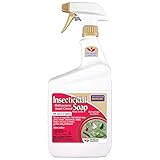 Top
Top
Top
Top
Top
Top
Top
Top | Bonide Insecticidal Soap | Check Offer On Amazon |
 Top
Top
Top
Top
Top
Top
Top
Top | Bonide 32 oz Spray Neem Oil for Organic Gardening | Check Offer On Amazon |
 Top
Top
Top
Top
Top
Top
Top
Top | Garden Safe Fungicide | Check Offer On Amazon |


